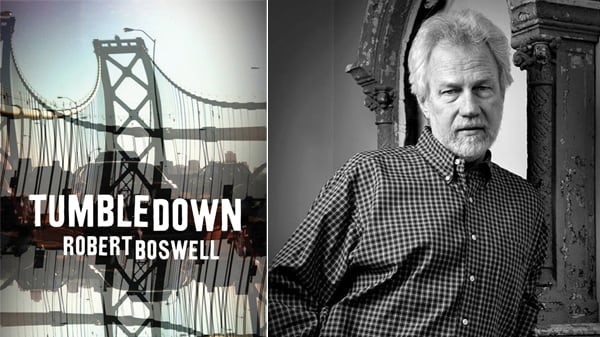Jim Candler is a promising therapist at the Onyx Springs Rehabilitation and Therapeutic Center in California. He owns a big (if ugly) house, drives a Porsche, and is engaged to be married to a beautiful young woman. He’s also in line for a big promotion at work, and has helped get his hapless childhood friend a good job at the clinic. Everything appears to be going perfectly, but appearances can be deceiving. In Tumbledown, Robert Boswell’s first novel in a decade, Jim Candler and his faux-perfect life take center stage. “He was facing a controversial promotion,” Boswell writes, “could not afford his combined house and car payments, hardly knew the woman he was engaged to marry, could barely keep up with his clients’ complicated lives, and had just signed on for his fourth credit card. Tick tock, his head was rocking. He wiped down the shower stall and sprayed it with cleaner. He squeegeed the shower door. The more uncertain his mental state, the cleaner his bathroom.”

Uncertain mental states propel Boswell’s subtly ambitious book, a sprawling portrait of a large, dysfunctional family of circumstance tied together by bonds of mutual dependence. Candler is a good-looking guy (but not too good-looking), and smart (but not too smart). He’s a cut above mediocre, and that’s as surefire a formula for success in America as any. But he’s adrift. He is also a man stalked by his past, in both a literal and figurative sense. He only got into the mental-health profession because he’s haunted by the suicide of his autistic brother, Pook. And then there is Lise, a former prostitute whose life Candler helped get back on track many years ago. She has changed quite a bit since then—new name, new look, new attitude—but she has never forgotten James Candler, and she’s determined to force her way back into his life by any means necessary, despite his having long forgotten about her.
Boswell is a man of the modern West, a spiritual descendant of the Wallace Stegner school of writing. He’s difficult to pigeonhole, though, and has gone off the reservation at times, winning a Phillip K. Dick Award for his 1995 book, Virtual Death (which was written under the pseudonym Shale Aaron). In Tumbledown, the California landscape, while artfully rendered, takes a backseat to exploration of his characters, who all exist in various states of personal disrepair. Karly Hopper is a drop-dead gorgeous woman with an IQ of 65 and a childlike sense of the world. Mick Coury was a normal teenager with a Firebird and a good-looking girlfriend until schizophrenia incapacitated him at 17. Alonso is a serial masturbator whose biggest accomplishment to date was learning to service himself behind closed doors rather than out in public view. Candler helps them to engage with the world, but he is in many ways the most damaged of them all. “How the holy fuck did people know what to do with their lives?” he wonders in one of his more self-reflective moments. “Candler gave them tests to help them see where their interests lay, but shouldn’t they know what interested them? Shouldn’t that be one of the things in life that was absolutely obvious?”
This is the same question that plagued many of Boswell’s characters in his 2009 story collection, The Heyday of Insensitive Bastards. It’s clear, though, that the only thing that’s absolutely obvious is that nothing is at all absolutely obvious. Candler can’t even decide which of his deeply flawed relationships he wants to commit to. After meeting his best friend, Billy Atlas, at a bar (formerly a Long John Silver’s) to talk about his amorous quandary, Billy gets to the heart of the matter: “Either choose Lise or quit thinking about her. If you’re thinking about marrying Lolly while you’re obsessed with Lise, well, I’m no expert, and I’ve had less than perfect luck with women, but I think that makes you a prick. You need to pick one and stay with her. It’s not actually complicated.” But for Candler, it’s the most complicated thing in the world. His motivations are a mystery even to himself. What this counselor really needs is a therapist with whom he can talk things through, rather than a network of well-meaning but poorly adjusted kids.
At first, it’s easy to get a little bogged down in Boswell’s Altman-esque landscape. Keeping patients, love interests, backstories and co-workers straight can be trying at times. But Tumbledown is worth sticking with, though, and it blossoms in surprising ways. The dialogue between patients feels natural, like something you would overhear at a bar full of paranoid schizophrenics just before closing time. That is to say, it’s hilarious, sad, messy, and often unintentionally insightful. Boswell manages to treat each of his lost souls—even the most shabby, offensive, and insane among them—with affection and understanding. And Candler’s is an important question: what do people do with their lives? For most of us, working stiffs and mental patients alike, the answer is less clear-cut than ever, but fortunately Boswell knows exactly what he’s about. He’s writing excellent books about the complexities, frailties, and triumphs of human relationships in the modern age.





